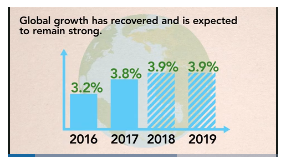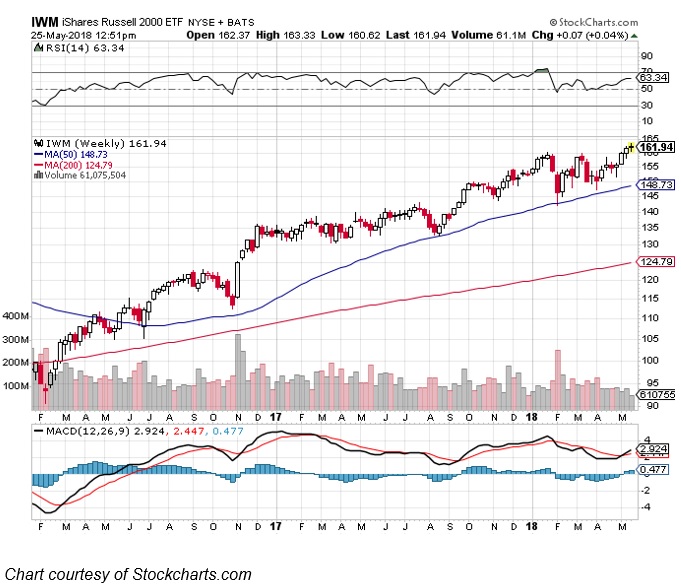Summertime Seasonality about to Kick in
The week leading up to the extended Memorial Day holiday weekend is typically an upbeat one for stocks.
More confusion about the deal or no-deal situation with China and the possible delay of the North Korean summit affected stocks last Wednesday, but buyers stepped in on the sharply lower opening to support the market. This past Thursday, the meeting with Kim Jong-un was officially canceled and led to a setback for obvious reasons, thereby triggering a more cautious stance by investors, who scurried to the bond market and sent the yield on the 10-year Treasury down to 2.93%.
While the news of the canceled summit might have caused the market to pause temporarily, the broader tone of late has been improving, as evidenced by the market’s resilience to negative headlines. Then again, though, there’s been a rotation of leadership that has allowed the tech sector to regroup after getting “de-FAANG-ed” for much of the February-April timeframe. It was the energy, railroads and materials sectors that took the lead while the market’s favorite sectors (tech, financials, defense/aerospace and industrials) consolidated during the first-quarter earnings season.
Heading into the last week of May, the FAANG stocks have reasserted themselves, with only Alphabet trading off its all-time high. There is also excellent leadership from other market favorites such as Microsoft (Nasdaq: MSFT), Micron Technology (Nasdaq: MU), NVIDIA Corp. (Nasdaq: NVDA), Adobe Systems (Nasdaq: ADBE), Boeing (NYSE: BA), MasterCard (NYSE: MA), JPMorgan (NYSE: JPM) and some specialty retailers like Tiffany (NYSE: TIF), Ralph Lauren (NYSE: RL) and TJX Companies (NYSE: TJX). So, despite the news surrounding North Korea being a non-starter, the domestic and global economies continue to exhibit steady growth.
The International Monetary Fund’s April 2018 World Economic Outlook forecast cited a cyclical upswing that was fostered by structural change. The report stated, “The global economic upswing that began around mid-2016 has become broader and stronger. This new World Economic Outlook report projects advanced economies as a group will continue to expand above their potential growth rates this year and next year before decelerating, while growth in emerging market and developing economies will rise before leveling off.”
World growth strengthened in 2017 to 3.8%, with a notable rebound in global trade. It was driven by an investment recovery in advanced economies, continued strong growth in emerging Asia, a notable upswing in emerging Europe and signs of recovery in several commodity exporters. Global growth is expected to tick up to 3.9-4.0% this year and next year, supported by strong momentum, favorable market sentiment, accommodating financial conditions and the domestic and international repercussions of expansionary fiscal policy in the United States. The partial recovery in commodity prices should allow for a gradually improvement in the conditions of commodity exporters.

Source: www.imf.org
Against this bullish macroeconomic backdrop, the primary bull trend should remain intact, while still being subject to seasonality issues and geopolitical disruptions such as what we’ve witnessed this week. The market is entering somewhat of a quiet period now, where first-quarter earnings season has concluded and the Fed’s Federal Open Market Committee (FOMC) meeting slated for June 13 is highly expected to result in a quarter-point hike in the Fed Funds Rate to 1.75-2.00%.
Aside from mergers and acquisition news, it is my view there won’t be a lot of market catalysts to drive the major averages to new highs. The only exception may be the Russell 2000, which has achieved a new all-time high this week. The rotation to small-cap stocks is a direct result of the strong move up for the dollar and how small caps lagged the other indexes for 2017 and early 2018. It is the small-cap market’s time to shine, and this is where investor focus has turned to of late.

Income investors looking to capitalize on the bull market in small-cap stocks can buy shares of the iShares Russell 2000 ETF (NYSE: IWM) and sell out-of-the-money calls against the underlying stock. A purchase of 300 shares of IWM at its current price of $162 will cost $48,600. One put or call option contract represents the right to buy or sell 100 shares of stock. The current bid for the IWM July 20 $165 Calls is $1.67 per contract. Translated in real dollar terms, that’s $167.00.
If 300 shares of IWM are owned, then three contracts of the IWM July 20 $165 Calls can be sold against the position, creating a covered-call strategy. Selling three calls at $167 each generates $501.00 that is immediately credited to one’s account. That $501.00 divided by the cost of the 300 shares of IWM ($48,600) = 1.03%. Imagine being able to sell call options against the underlying position every month or two for the same amount. In doing so, one can generate an annual yield of 7-12% that pays every 30-45 days. It’s a fantastic way to manufacture a steady income in a rising market.
If shares of IWM close above $165 on July 20, the 300-share position will be “called away,” or sold, because the selling of the calls gives the buyer of the calls the right to buy the stock at $165, which is exercised 100% of the time. Since the IWM stock was bought at $162, there would be a capital gain of $3, plus the $1.67 call option premium received. That equates to a total gain of $4.67, divided by the $162 cost basis to produce a profit of 2.9%. That return is not bad for a six-week holding period.
Do that eight times over the course of a year and the return is 23%-plus. This is index-income investing at its best. I show investors how to produce monthly income like this every week in my Quick Income Trader service, which specializes in selling call and put option premium for significant income using market-leading stocks like Intel (Nasdaq: INTC), Cisco Systems (Nasdaq: CSCO), PayPal Holdings (Nasdaq: PYPL), as well as exchange-traded funds (ETFs) to generate attractive option premium and capital appreciation. Information on Quick Income Trader can be found by clicking here to let income-oriented investors seize upon what option pros call “free money.”

